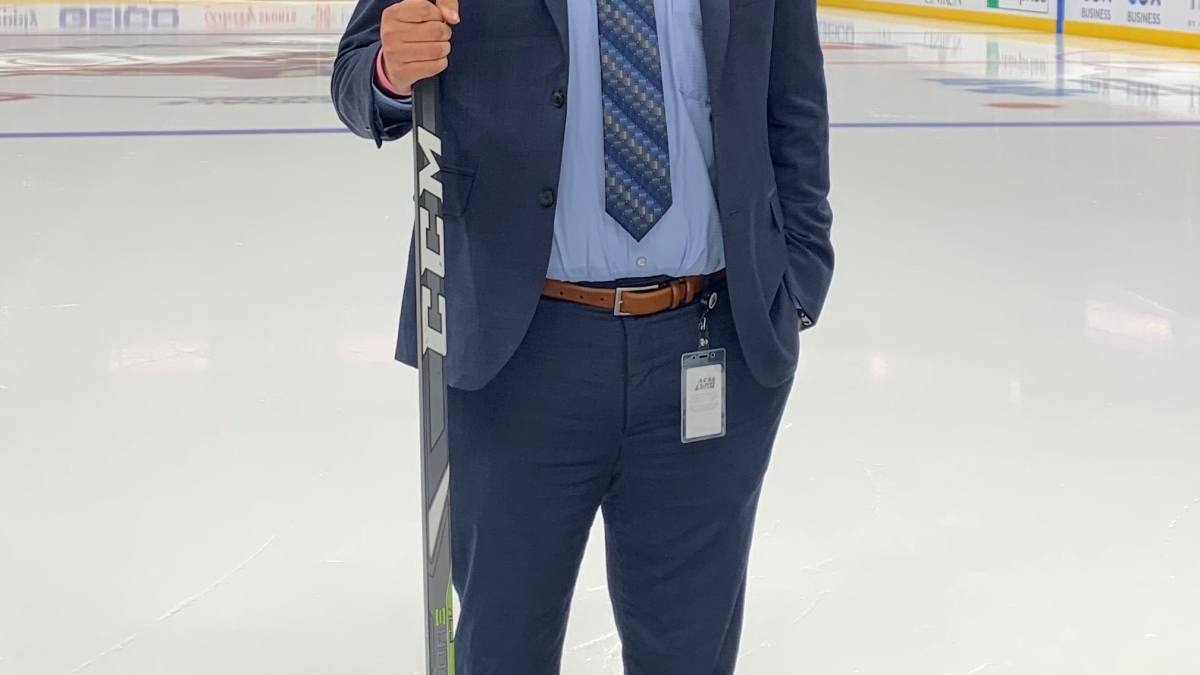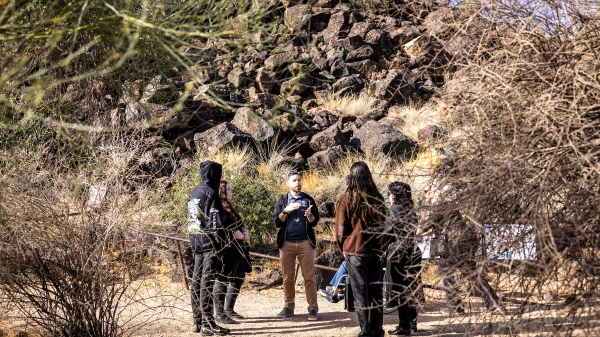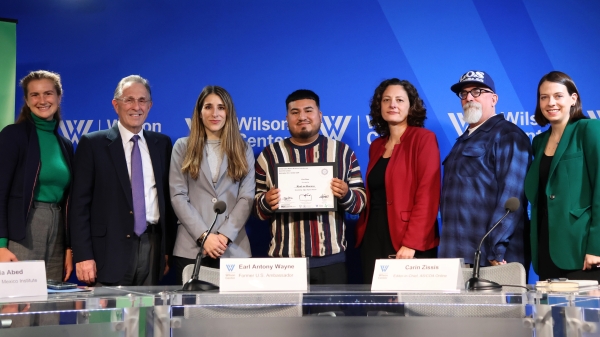From planning events to doing the mascot’s laundry, Coyotes intern’s experience is all coming out in the wash

Payton Padilla on the ice at Gila River Arena in Glendale. Photo courtesy of Payton Padilla
Editor's note: This story is part of a series of profiles of notable spring 2022 graduates.
The names Suns, Cardinals and Diamondbacks were initially on Payton Padilla’s mind while he searched an athletics industry website for an internship to expand his knowledge of how sports are managed.
When he came upon one called “PUCK internship,” he immediately realized he had forgotten the Valley’s fourth big-league organization, the Arizona Coyotes hockey team.
PUCK didn’t merely refer to what hockey players swing their sticks at for 60 minutes each game. It stood for something: Professional Uplifting Career Knowledge.
Padilla, a student in the School of Community Resources and Development, scored a goal with his application: He was one of six interns chosen from about 150 applicants. The professional uplifting career knowledge began, with tasks ranging from the routine, such as arranging to get player-autographed jerseys to charity auctions, to the creative, including planning team events.
Among the latter was Padilla’s and a partner intern’s capstone project, where they created an Olympic night commemorating the 18th anniversary of “Miracle,” a film about the “Miracle on Ice,” the 1980 U.S. Olympic hockey team’s surprise defeat of the Soviet Union. The event featured several hopefuls for the current U.S. team and former NHL players.
And some of the routine duties? Well, someone has to wash the suit worn by Howler, the team mascot.
“The head and tail have to be hosed down and sprayed with Lysol,” Padilla said. “The rest of it goes into the washer.”
Still, the experience involves far more than laundry duty. Currently Padilla, who this May will earn his Bachelor of Science in community sports management with a certificate in special events management, is working with several team departments on the Coyotes’ plan to temporarily move into ASU’s new multipurpose arena in fall 2022.
Read on to learn more about Padilla’s internship and his preparations for a sports management career:
Question: Tell us a little about yourself. Where are you from?
Answer: I am originally from the Los Angeles area, La Puente to be exact. I originally went to Northern Arizona University and was majoring in political science because I wanted to eventually run for public office. During my freshman year I decided that field just was not for me and transferred down to ASU to study to eventually work in the sports field. Now as I am getting ready to graduate, I am getting ready to find a sports organization to join.
Q: What was your “aha” moment, when you realized you wanted to study the field you majored in?
A: I had picked up a job at Scottsdale Stadium as a warehousing associate in February 2020 during my sophomore year, a month before everything shut down due to the COVID-19 pandemic. I was delivering peanuts, hot dogs, sodas and alcohol around the stadium to different concession stands, luxury suites and even the players dining hall.
Aside from doing all that, I asked my boss if I could get involved anywhere else just for some extra hours to help make ends meet. Little did I know I was working for anybody in that stadium that needed help, running the bar on game days, stocking all concessions on off days, helping with batting practice for the players, working special events in the stadium like weddings, business meetings, and even did some work with the grounds crew.
I think on game days, hearing the roar of the crowd, the crack of the bat, the adrenaline rush when gates open and fans come pouring into their seats or having them tell me they enjoyed their experience, left me with that feeling of accomplishment. Having experienced those was my “aha” moment that I want to be involved in sports in any capacity. I have been chasing that adrenaline rush ever since that spring training season. After almost a two-year break from sports due to the pandemic, I am back chasing those adrenaline rushes again.
Q: Tell us about your internship with the Arizona Coyotes. What kind of work to you do?
A: My internship with the Arizona Coyotes is a rotational internship between six different departments. Me and my partner rotate once a month through departments throughout the organization for the duration of the season. The departments we rotate from include ticketing, hockey development, corporate partnerships, community impact, game presentation and marketing. Each department has a monthlong project that we work on along with more game-day responsibilities. Some of those responsibilities include setting up happy hours, helping with group events, educational events, a 50/50 raffle and special jersey auctions. Mostly in office we can volunteer at charity events and sit in on meetings with our department heads.
Q: What kinds of things are you involved in to promote fan interest and attendance in Coyotes games?
A: We’re a rebuilding team, so the way they approach it is to keep people excited about young players, having them check in “down on the farm” on young prospects and offer giveaways. Also, we promoted the longest-running Ironman streak (consecutive games played by a single player). (Coyotes winger) Phil Kessel is 35 games away from playing in 1,000 straight games. He is now the active player with the longest streak.
Q: What advice would you give to students thinking of interning with a big-league sports franchise?
A: One thing I would tell students is get out there and shake hands with people. Create those connections because the sports industry is a small community, and you never know when you can call on someone from your past to help you out. Another piece would be to ask questions, ask to get involved in different departments. If you have an internship, ask to do things outside of the description. It will help build your skills, you will become more well-rounded for future jobs and you will be able to learn more about the different processes that go into running a professional sports franchise.
During the pandemic everything was online, but now that we’ve come back a bit, I’m making a point to do things in person. They’ll remember you. You’ll make better connections. After interviews, send them an email thanking them. I feel that really has paid dividends for my upcoming career.
Take pride in your work, so when someone does vouch for you, you have something to speak about, something you’re proud to attach your name to. It’s old school, and it still works.
Q: What do you hope to do with your degree?
A: With my degree I hope somewhere along my career I can give back to my community in the form of youth sports. I grew up playing youth sports; one of my first jobs was coaching at a YMCA. This internship has given me the ability to see how community impact and grassroots marketing take approaches to growing different sports. It is something I would love to pursue because it is a rewarding experience to give kids the ability to play sports and make friends in the community.
Q: What is something you think would surprise people to learn about you?
A: I think something that would surprise people is my love for cooking and baking. I come from a family that enjoys cooking, and I grew up watching Food Network on Saturday morning growing up. My mom showed me how to make a lot of different recipes and passed down recipes since I was a kid. I also use the office as guinea pigs for new cookie recipes. I am also big into music, and Spotify is by far a staple in my life, on the way to and from work, even while sitting in the office.
Q: What is in your Netflix queue, or what movies/shows have you been recently hooked on?
A: I am really big into movies right now and am trying to learn more about the game of hockey and all sports in general. So, the ESPN “30 for 30” series is what I have been hooked on recently. I just finished “King’s Ransom,” and it was great to see a major part of NHL history when Wayne Gretzky was traded to my hometown LA Kings. I have been watching different “30 for 30s” on boxing, soccer, football, basketball. If you want to learn about major events in sports, definitely check out that series. Now they have smaller episodes for smaller events, too.
More Arts, humanities and education

Petroglyph preserve celebrates 30th anniversary with ancient, modern tales
The Deer Valley Petroglyph Preserve provides a beautiful walk through a pristine desert where chuckwalla lizards are as plentiful…

Kaleidoscope short film contest inspires powerful binational filmmaking in its second year
“We come to this country not to steal anybody’s jobs but to take advantage of the opportunities that the rest ignore. We’ve been…

ASU's Neal Lester reflects on life, death of poet Nikki Giovanni
When Neal Lester heard on Monday that poet and activist Nikki Giovanni had died, the news hit hard.Lester, the founding director…